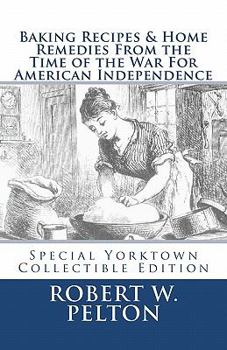Baking Recipes & Home Remedies From the Time of the War For American Independence: A Unique Collection of Recpes & Remedies Used in the Homes of Signe
The Colonial homemaker had to dry her spices in front of the fireplace. They were then pounded until finely powdered and sifted.Raisins are an example of the amount of effort it took to properly prepare everything for baking. Raisins, almonds, pineapples and chocolate were all imported from West Indies. Raisins had to first be washed and then firmly rubbed with a towel. This was done to remove the stems.Available flavorings commonly used in Colonial baking included honey, molasses and lemon. These were all readily available. Most spices were imported from the West Indies.Of all the foods enjoyed by the early Colonists, oats were one of the first to be imported. Oats initially came to New England on a British ship in 1602. Settlers in Plymouth began planting oats. Neither oats nor peanuts were initially used in the earlier Colonial baked goods. Oats were considered of no value other than horse feed. Peanuts were only to be fed to hogs. But both soon became a food staple on Colonial breakfast tables and for baking.The first wheat was sown in 1611 Colonial Virginia. And in 1626, samples of wheat grown in the Dutch Colony at New Netherlands were exhibited in Holland. Wheat was ordered from England in 1629 to be used as seed.It is probable that wheat was sown in the Plymouth Colony prior to 1629, although there is no record of this. In those days, homemakers couldn't always buy good flour. Almost every sack or barrel presented new baking problems. Flour always had to be tested for quality before using. Some disreputable businessmen added certain inexpensive ingredients (corn, peas or beans) to their flour in order to stretch the quantity when it was bagged and sold to the Colonial homemaker.Elizabeth Phillips, wife of Brigadier General Horatio Gates (1728-1806), wrote this tidbit: "If any corn has been ground with it, the flour will be a pale brown. If peas or beans have been ground with it, a still darker brown."
Format:Paperback
Language:English
ISBN:1456461982
ISBN13:9781456461980
Release Date:January 2011
Publisher:Createspace Independent Publishing Platform
Length:444 Pages
Weight:1.23 lbs.
Dimensions:1.0" x 5.5" x 8.5"
Customer Reviews
0 rating





